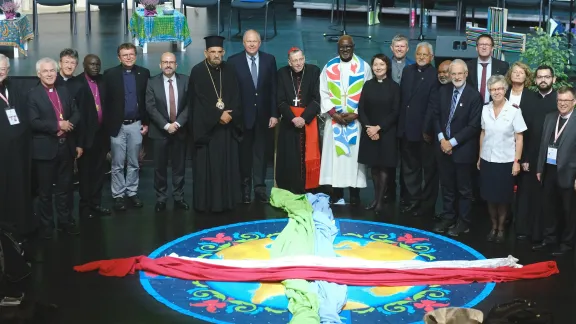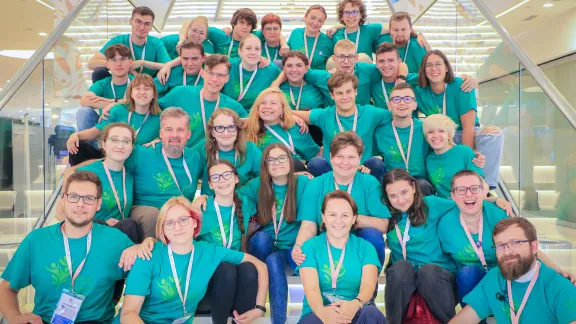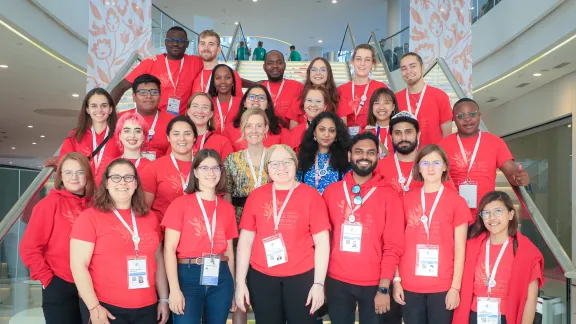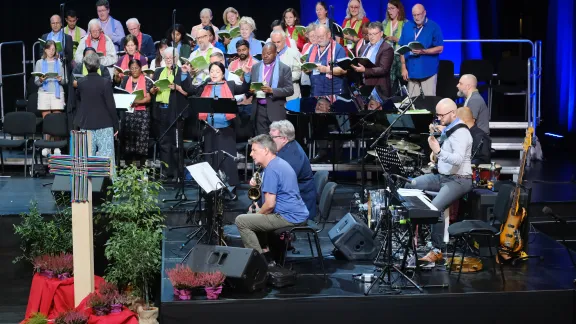New perspectives for the ecumenical journey
Ecumenical leaders meet together in Krakow, as Lutherans and Catholics present a joint statement looking forward to the 500th anniversary of the Augsburg Confession which sought “to maintain the unity of the church.”

LWF leaders with the ecumenical guests taking part in a panel discussion on the closing day of the LWF Thirteenth Assembly in Krakow, Poland. Photo: LWF/M. Renaux
Leaders of seven Christian world communions meet in Krakow to share insights on road to reconciliation
Leaders of seven Christian world communions – Anglican, Catholic, Lutheran, Methodist, Orthodox, Pentecostal and Reformed – met together in Krakow for a panel discussion on the future of their ecumenical journey. The event took place on 19 September on the closing day of the Lutheran World Federation (LWF) Thirteenth Assembly, which has been focused on the theme ‘One Body, One Spirit, One Hope.’
Ahead of the discussion, LWF General Secretary Rev. Dr Anne Burghardt and the Prefect of the Vatican’s Dicastery for Promoting Christian Unity Cardinal Kurt Koch presented a Common Word to the Assembly, stating that dialogue between Lutherans and Catholics ahead of the 500th anniversary of the Augsburg confession in 2030 “could lead to another ‘milestone’ on the way from conflict to communion, comparable to the landmark Joint Declaration on the Doctrine of Justification (JDDJ).”
The language of “justified by God through faith alone” is a message of reconciliation that “must come alive for people today.
LWF General Secretary Rev. Dr Anne Burghardt
Speaking during the panel discussion, Burghardt stressed that “the doctrine of justification is [the] touchstone for the Christian faith,” but the common task is “to translate that message for our time,” in a world challenged by those “proclaiming [a] prosperity gospel,” or “fundamentalist approaches to Scripture” and other “misleading theologies." The language of “justified by God through faith alone” is a message of reconciliation that “must come alive for people today,” the Lutheran leader said.
Cardinal Koch also highlighted the urgency of bringing the message of God’s grace and human freedom to a world in which "justification has become a foreign term.” Justification, he said, is not so much “a doctrine” but “an event,” that takes place in baptism. The work for Christian unity, he added, must be understood as “a profound matter of faith” and not a political agreement based on compromises.
Leaders of the three other global Christian communions that have signed the JDDJ – Methodists, Anglicans and Reformed – also shared perspectives on what the concept of justification means in their contexts today. The General Secretary of the Methodist World Council, Bishop Ivan Abrahams said his tradition, founded by reformer John Wesley in the 18th century, “brings the ability to adapt, grow and transform,” but also an understanding that “orthodoxy and practice must go hand in hand.” Justification, he said, is not “an isolated event, but a journey towards holiness” and service of neighbor, implying social transformation.
Opening spaces for engagement
Secretary General of the Anglican Communion, Bishop Anthony Poggo, noted that the JDDJ echoes the so-called “Five marks of mission” which the Church of England adopted in 1996 to explain the key responsibilities of Christians to proclaim, to teach, to serve, to transform and to treasure God’s creation. Christians share “a common concern for growing the fruits of justification,” he said, adding that “Christian unity matters and justification drives us to be truly one.”
Rev. Dr Hanns Lessing, acting General Secretary of the World Communion of Reformed Churches, (WCRC) noted that his communion took twenty years to adhere to the JDDJ, because of concerns that it did not focus enough on the relationship between justification and working for justice in the world. Reformed churches, he said, bring a call to “open spaces for engagement” and to rekindle the flame of prophetic witness for justice and peace. He called for “a prophecy of grace.”
Two other panelists, Orthodox Metropolitan Kyrillos from the Ecumenical Patriarchate and Dr William Wilson, President of the Pentecostal World Fellowship, also offered reflections on the understanding of justification within their traditions. The former pointed to different theological understandings of original sin and God’s work of salvation, while the latter emphasized the personal experience of grace and transformation of the person who is saved by God’s love.
Professor Dirk Lange, LWF’s Assistant General Secretary for Ecumenical Relations, said: “The Ecumenical Panel was a sign of our growing unity with the leaders and general secretaries of seven world communion together in prayer and dialogue.” He concluded: “Their discussion and insights opened new perspectives for our journey together.”
Originally signed by Catholic and Lutheran leaders in 1999 in Augsburg, Germany, the JDDJ marked a turning point in Lutheran-Catholic relationship by affirming a common understanding of the principle of justification which had divided the churches since the days of the Reformation. The document proclaimed that the mutual condemnations of the 16th century no longer apply to Lutherans and Catholics today.


